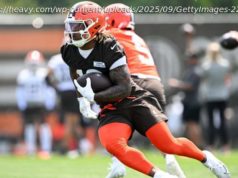Former FBI director James Comey’s detailed notes on his multiple conversations with President Trump raise the question of whether they rise to the level of obstruction of justice.
Former FBI Director James Comey ‘s detailed notes on his multiple conversations with President Donald Trump raise the question of whether those exchanges rise to the level of obstruction of justice.
If so, it would be a difficult charge to bring against Trump, according to Columbia University law professor John Coffee.
“It’s generally believed that you cannot indict a sitting president because that would paralyze the government, ” said Coffee. “And because impeachment is the constitutional procedure created to remove a president.”
Any formal charge of obstruction against Trump would rest heavily on the exact wording of any exchange with intelligence or law enforcement officials, he said. Short of impeachment, it’s unlikely such an obstruction charge would be brought directly against Trump by the current Justice Department, said Coffee.
“Any U. S. Attorney who brings an indictment can be overruled by the Attorney General — even if the case is meritorious, ” he said.
At issue is whether Trump’s comments to Comey represent part of an effort to thwart several probes into whether Russia interfered in the 2016 election that swept Trump into office.
On Wednesday, the Senate Intelligence Committee posted Comey’s opening statement for a scheduled Thursday hearing on Trump’s firing of the FBI chief on May 9. In that prepared testimony, Comey said Trump asked him to back off on bureau’s investigation of former national security adviser Michael Flynn as part of the its probe into his Russian ties.
Comey said Trump told him at a Jan. 27 dinner that: “I need loyalty. I expect loyalty.”
Trump’s outside counsel, Marc Kasowitz, highlighted that Comey says he told Trump that the president was not personally under investigation. In a statement, the attorney said that the president feels “completely and totally vindicated” and “is eager to continue to move forward with his agenda.”
Senate investigators are also looking into reports of a wider White House effort to interfere with probes into the administration’s ties to Russia.
At a Senate hearing Wednesday, Director of National Intelligence Dan Coats and National Security Agency Director Adm. Mike Rogers issued blanket statements that they had never felt “pressured” to influence an investigation. But they repeatedly declined to comment specifically about media reports that Trump asked them to publicly say that evidence showed that Trump’s campaign did not collude with Russia.
Coats also would not speak specifically about a Washington Post report that Coats told associates that Trump asked him if he could persuade Comey to ease off the Flynn probe.
The evidence of obstruction goes beyond any single comment from Trump, said Gerald Lefcourt, a white-collar defense lawyer based in New York. Trump not only talked to Comey about the probe, he also reportedly asked two top intelligence officials to push back against it and told Russian diplomats in the Oval Office that firing Comey relieved “great pressure.”
“If you put it all together, it’s clear that he was trying to do everything in his power to stop the FBI investigation of Flynn, ” Lefcourt said.
Lefcourt said the evidence is likely enough for an obstruction of justice case to go to a jury and “way more than enough for impeachment purposes.”
Impeachment of a U. S. president requires a majority vote in the House of Representatives on specific articles of impeachment, a set of charges similar to an indictment. Those charges are then heard in a Senate trial overseen by the chief justice of the Supreme Court. Removal of a president requires a two-thirds vote majority in the Senate.
But such a vote by the Republican-controlled House of Representatives, so far, appears highly unlikely.
Democratic leaders have said any talk of impeachment should be tabled until the completion of multiple ongoing investigations into Trump’s dealings with Russia
But Rep. Al Green, D-Texas, who said he plans to begin drafting articles of impeachment, has said that Trump’s firing of Comey on May 9 amounted to obstruction of justice.
“The facts are simple and indisputable, ” Green said Tuesday in a statement. “The president fired the FBI director because the director was investigating the president’s campaign connections to Russian interference in the presidential election.”
Trump has already demonstrated his willingness to fire Justice Department officials who defy his wishes. On Jan. 30, Trump dismissed former Deputy Attorney General Sally Yates after she instructed the department not to defend the president’s executive order calling for a travel ban on several people from predominantly Muslim countries.
In March, U. S. Attorney General Jeff Sessions abruptly demanded the resignations of 46 federal prosecutors, including Manhattan U. S. Attorney Preet Bharara, who said he had been asked to stay on in November by then President-elect Donald Trump.
There have been only a handful of instances in U. S. history of top Justice Department officials publicly breaking with the White House.
The most famous example was in 1973, when then-Attorney General Elliot Richardson and his deputy resigned rather than obey President Richard Nixon’s order to fire a special prosecutor investigating the Watergate scandal.
The incident, which became known as the “Saturday Night Massacre, ” was a public relations disaster and is seen as a turning point in Nixon’s administration.
Reuters contributed to this report.






